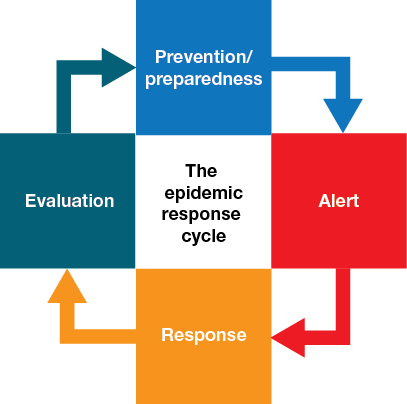Session 2.2. Epidemic response cycle
By the end of this session, you will be able to:
- Explain the epidemic response cycle.
- Use this cycle in real life.
Part 2.2.1. The epidemic response cycle
This concept helps us to think about epidemics better in terms of time and to understand how we can limit the harm an epidemic might do in the community.
Epidemics tend to occur in cycles, not in sequence (one after the other). When an epidemic occurs, the way it is handled and the actions that are taken to respond to it will affect the behaviour of a future epidemic. This means that, if we respond well to an epidemic now, we will limit the rate of sickness and number of deaths this time and also reduce the impact of future epidemics. This idea is uncomplicated and helps us to understand our role in an epidemic and what we need to do at every stage.
Every epidemic response has four main phases. They are:
- Prevention/preparedness. In this phase, we identify the risk factors associated with epidemics and during the period between epidemics prepare ourselves to manage them.
- Alert. We detect cases of disease that have the potential to become epidemics and start to mobilize the resources we will need to respond to them.
- Response. We take action to deal with the epidemic.
- Evaluation. We review how we responded to the epidemic after it is over.
This cycle is portrayed in the diagram below.
Figure 7. Epidemic response cycle

At each phase of the cycle, we can do certain things to reduce the harmful effects of an epidemic on the people in our communities. We will talk in more detail about some of these actions as we proceed. For now, we list only what needs to be done at each stage.
| Prevention and preparedness | Alert | Response | Evaluation |
|---|---|---|---|
|
Prevention. We work to prevent epidemics. For instance, we promote good habits in the community, address risk factors, and build the infrastructure we require, including community-based surveillance, to detect risks promptly. Preparedness. We prepare between epidemics. During these periods, we have time to learn, assemble material and equipment we need, and train personnel and volunteers. |
At this stage, we do not yet know whether an epidemic has started, but more cases than usual of the disease have appeared in the community, increasing the likelihood that an epidemic may occur soon. We mobilize volunteers, refresh their knowledge, and prepare to respond if an epidemic is declared. One important step in the alert phase is to start the epidemic assessment. | As soon as an epidemic is confirmed by the Ministry of Health or the district health authorities, we start our response. We have already discussed some of the ways in which volunteers can help during an epidemic, including the importance of health promotion. We will continue to discuss these throughout the manual. | After the epidemic is over, it is very important to review how the epidemic was managed (what you did) and what can be done better next time (in future epidemics). Without a proper evaluation, we are likely to repeat mistakes. In the light of the evaluation, we can improve our preparations for the next epidemic and work more effectively to prevent epidemics occurring in the first place. |
Part 2.2.2. What role do volunteers play in the epidemic response cycle?
Volunteers can play a useful role at each stage of the epidemic response cycle. However, our actions are not identical in every epidemic. Some actions are general and relevant to all epidemics, while others are more specific and only apply to certain epidemics. For now, we will try to think of the general things that volunteers can do at each phase of the epidemic response cycle.
In the next group work activity, you will list your ideas. Then, in Module 4, we discuss in more detail the actions that can be taken at each stage. When you learn to use the toolkit, you will discuss the more specific actions that volunteers can take to help their communities during an epidemic.
Group work
Complete some of the main actions you think should be taken at each stage of the epidemic response cycle. Concentrate on actions that are not specific to a certain kind of epidemic but relevant to all epidemics.
| Prevention | Preparedness | Alert | Response | Evaluation |
|---|---|---|---|---|